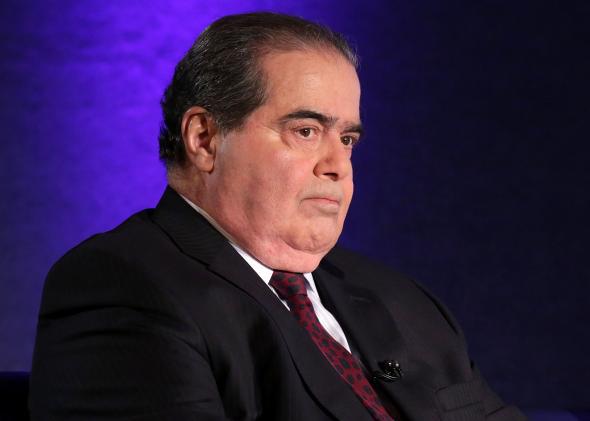Should Justice Antonin Scalia recuse himself from voting on McCullen v. Coakley, the Supreme Court case regarding a Massachusetts law that provides abortion clinic workers and patients a 35-foot buffer zone around clinics? Lauren Rankin of Salon argues yes, on the grounds that Scalia’s wife, Maureen Scalia, worked—and may still be working—for an organization that has a direct interest in the outcome of the case:
Justice Scalia’s wife, Maureen Scalia, is a “Pro-Life Advocate” who, until last Monday afternoon, was listed on its website as a board member of the Nurturing Network, a crisis pregnancy organization. In an email to Salon, Ann Granger, director of communication for the Nurturing Network, stated that Maureen Scalia is a past board member of TNN, but no longer on its board. Granger also stated that she would let the webmaster know to update this information. Soon after, Maureen Scalia vanished from TNN’s current Board of Directors page (though this cache of the page on April 7, 2014, shows her listed on the website). Her TNN profile page is still live, as well.
Rankin also notes that, prior to being updated earlier this week, the Nurturing Network’s website lists Maureen Scalia as a “Crisis Pregnancy Counselor” at Hope, a crisis pregnancy center in Northern Virginia. (Hope would not confirm or deny Scalia’s current involvement.)
While some clinic harassers are free agents, as Rankin notes, a lot of them are organized through these crisis pregnancy organizations like the Nurturing Network—organizations that provide anti-choice activists with information about clinics and clinic employees, teach them tactics for haranguing patients going in, and provide them signs and pamphlets. Regardless of whether Maureen Scalia actually goes out to clinics to pester patients herself, her involvement with crisis pregnancy centers suggests that her work could be directly impacted by the outcome of this case. Now the question is, does this involvement mean that Scalia should recuse himself? Law professor Steven Lubet wrote in a 2000 “Explainer” for Slate:
Reasons for disqualification are laid out in the United States Code (Title 28, Section 455), but the justices themselves are their own final arbiters. According to the statute, justices, judges, and magistrates should recuse themselves if they have a personal bias concerning anyone in the case, or independent knowledge of the facts in dispute; if they worked on the case as a private or government lawyer; or if they or close relatives have a financial interest in the case.
“Money and family come up the most as reasons for recusal,” he adds, citing cases where Justices Stephen Breyer and Ruth Bader Ginsburg had financial holdings, with one including Ginsburg’s husband, that conflicted with their duty to be impartial judges. Of course, it’s unlikely that the Scalia family benefits financially from Maureen Scalia’s anti-abortion work, since most crisis pregnancy center workers are volunteers. However, as legal ethics professor Monroe Freedman points out to Rankin, the federal statute governing recusal “requires a judge or justice to recuse himself, without being asked to do so by a party, in any proceeding in which his or her ‘impartiality might reasonably be questioned.’ ” (Emphasis Freedman’s.) No one expects Scalia to do anything but vote, as he has in the past, against the pro-choice side, but this recusal question goes beyond just his views on reproductive rights to the issue of impartiality.
During the oral arguments for McCullen v. Coakley, Scalia echoed some of the disingenuous claims anti-choice activists level against buffer zones, arguing that this is “a counseling case, not a protest case” and that the anti-choicers “want to speak quietly in a friendly manner.” (Sadly, that is simply not the experience of actual clinic workers who have to deal with these folks on a regular basis.) Considering that his wife moves in the same circles that produce the people who pester patients at abortion clinics, that Scalia wants to paint these folks in the most flattering light possible is no big surprise.
Of course, the odds that Scalia will recuse himself are basically at zero. He knew before oral arguments about his wife’s affiliations, and that didn’t stop him from either hearing the arguments or parroting anti-abortion talking points himself. While Scalia is not wholly averse to recusing himself, he did reject a request for recusal from a case where he had to pass judgment directly on his good friend Dick Cheney. “A rule that required members of this court to remove themselves from cases in which the official actions of friends were at issue would be utterly disabling,” he argued, defending the decision. If that’s his reasoning, then it’s highly unlikely he will recuse himself simply because his decision could have a direct impact on his wife’s activist work. Still, he’s giving pro-choicers reason to claim that this case was not decided by an impartial judiciary.
